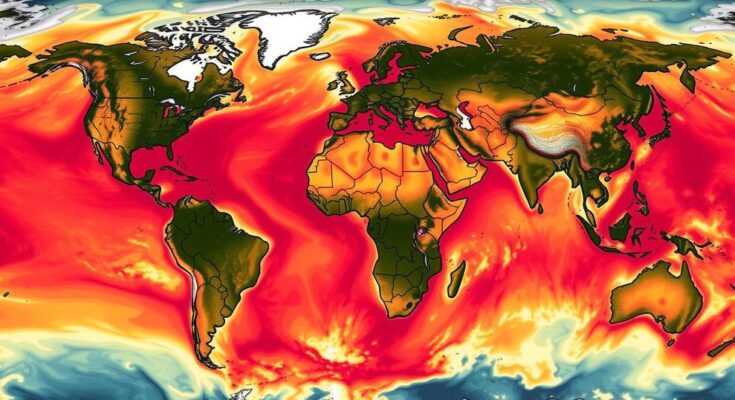2024 is confirmed as the hottest year globally for both land and oceans, with record temperatures reported by NOAA and NASA. The average global temperature was 1.46°C (2.6°F) higher than pre-industrial times, surpassing last year’s records. The trends point towards an accelerated pace of warming, necessitating urgent climate action as global temperatures are affecting ecosystems and intensifying extreme weather events.
According to recent confirmations from US government scientists, 2024 has been recorded as the hottest year in history for both the world’s land and oceans. The National Oceanic and Atmospheric Administration (NOAA) reported that last year’s global temperatures were on average 1.46°C (2.6°F) higher than pre-industrial levels, specifically referencing the era before extensive fossil fuel combustion began. This increase marks a 0.1°C (0.18°F) rise over the previous record set in 2023, reinforcing the alarming trend that all the ten hottest years recorded since 1850 have occurred within the last decade.
Furthermore, this data aligns with reports from European Union scientists indicating that 2024 was 1.6°C (2.8°F) warmer than pre-industrial times, surpassing the internationally acknowledged threshold of maintaining temperature increases below 1.5°C (2.7°F). NASA, corroborating these findings, indicated a similar increase of 1.47°C (2.6°F) compared to pre-industrial averages. Gavin Schmidt, a senior climate scientist at NASA, emphasized that the agreement among various scientific organizations is unequivocal regarding these figures, stating, “All the groups agree, regardless of how they put the data together, there’s no question. The long-term trends are very clear.”
The implications of this warmth are staggering; historically, temperatures from three million years ago, during periods when sea levels were significantly higher, only reached 3°C above pre-industrial levels. Schmidt expresses concerns regarding how quickly current temperatures are rising, noting, “We are halfway to Pliocene-level warmth in just 150 years.” This trend has resulted in record hot temperatures across several regions, including the United States, Europe, and Africa, as well as unprecedented warming in the Arctic.
Last year’s heat was not without consequences, as it amplified extreme weather events globally, including severe conditions in Mexico where howler monkeys were reportedly falling from trees due to high temperatures, catastrophic hurricanes affecting the southeastern United States, and devastating floods in Spain. Concurrently, Southern Africa experienced dramatically reduced rainfall.
The oceans, which absorb a substantial amount of global heat from fossil fuel combustion, have also recorded record temperatures. Scientists are investigating additional potential causes for the severity of the heat experienced beyond traditional anthropogenic factors and the typical El Niño phenomenon. Schmidt indicated that despite expectations, last year’s temperature increases were nevertheless profound and driven by other contributory factors.
Robert Rohde, lead scientist at Berkeley Earth, corroborated these observations, noting the rapid pace of recent global warming. He stated, “The abrupt new records set in 2023 and 2024 join other evidence that recent global warming appears to be moving faster than expected.” While crossing the 1.5°C mark in a single year does not negate the objectives set forth in the Paris climate agreement, it raises significant concerns about our trajectory. Distinguished officials, such as António Guterres, the UN Secretary-General, articulated the urgency for immediate and impactful climate action, asserting that “Blazing temperatures in 2024 require trail-blazing climate action in 2025,” highlighting the pressing need for leaders to address the current crisis proactively.
The climate crisis has been exacerbated by human activities resulting in a rapid increase in global temperatures. The records captured by NOAA and corroborated by NASA and EU scientists reflect an ongoing trend that poses serious threats to ecosystems and human security. Detailed analyses of these temperature records since 1850 reveal a concerning pattern where 2024 has surpassed all previous years in warmth, prompting urgent discussions on climate action and international agreements aimed at mitigation. By situating the current data within a historical context, one can appreciate the extraordinary rates of change caused by anthropogenic influences, particularly through fossil fuel consumption and land use changes.
The confirmation that 2024 has become the hottest year on record emphasizes the unprecedented escalation of global temperatures driven by climate change. With scientific consensus supporting these findings, immediate and ambitious climate action is essential to mitigate further catastrophic impacts. The persistent increase in temperatures and its correlating extreme weather patterns demand attention from global leaders to avert a worsening climate crisis. Without significant efforts to adhere to climate commitments, the targets set to limit warming may become unattainable, prompting potentially irreversible environmental consequences.
Original Source: www.theguardian.com




